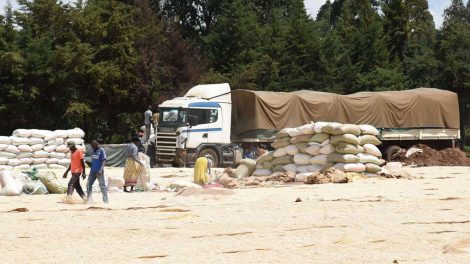Consumers of ugali and other products of flour are staring at a looming food crisis after millers rejected the allowed time frame to import maize to fill in the shortage with warnings that what is in the stores can’t run beyond June.
Millers wrote to the National Treasury last week requesting for an extension of the import window to end of June because of long logistical process in importation. The Agriculture ministry has, however, dismissed review of the deadline.Hamadi Boga And NCPB MD Albin Sang Swindled Sh1.8Bn From Strategic Food Reserve Funds.
In a gazette notice last week, National Treasury opened the imports window to millers to ship in two million bags between April 20 and May 30 at a reduced duty of 14% for white maize (two million bags) and 10% for yellow maize.
“We have confirmed that there will be no extension of the window that has been gazetted and we have come to a decision that we shall not make imports,” said an official of the Cereal Millers Association (CMA) who requested to remain anonymous.
According to the processors, the import window is short and those who dare to import may end up paying higher duty of 50% when consignments arrive after the expiry of the given.
“We cannot import unless the date is changed. By now we would have initiated the process, but we cannot because of the short window that was given,” said Mr Ken Nyagah, the chairman of the United Grain Millers.
Mr Nyagah said they have engaged the Ministry of Agriculture and agreed that the import window should be pushed to the end of June, only to learn of the changes in the April 20 gazette notice.
Association of Kenya Animal Feed Manufacturers are also in agreement with the lobby group as they also wrote to the Treasury secretary Ukur Yatani, requesting for the changes on the date.
The imports are expected to come from Mexico as it is the only source that the country relies on for white non-GMO maize.
Kenya had six million bags of maize since April and the country consumes three million bags every month meaning the stocks can only last to the end of June and therefore the deficit can be filled through imports.
Chief executive officer of Cereal Grain Growers Anthony Kioko warned that the imports should be managed well to avoid interference with the expected harvest of the short rain crops in South Rift, which normally begins in June through August.
“Imports may overlap with the short rain crop from South Rift as imported grain might spread all the way to August and this will impact negatively on farmers,” said Mr Kioko. import-4-million-bags-of-maize
Excess imports may result to lower prices of locally produced maize and Mr Kioko is urging the government to ensure that price of imported grain is not lower that the one that is locally produced.
But Dr Miltone Ayieko of Tegemeo Institute of Research, said that the 14% duty wont have a huge impact on traders as it only covers up the deficit but the produce will not land in Kenya at a lower cost than what farmers are selling at.


















